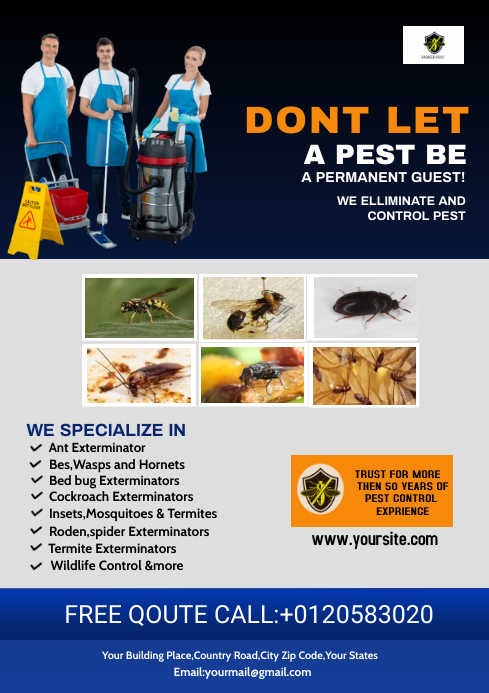Understanding Various Kinds Of Insect Control Techniques and Their Efficiency
When considering pest control techniques, it is crucial to recognize the diverse techniques offered and their varying levels of efficiency. By discovering the subtleties of these pest control methods, a detailed understanding of exactly how to attend to insect issues can be developed.
Chemical Pest Control Techniques
Chemical pest control techniques play an essential function in successfully handling and getting rid of pest infestations in different settings. These techniques include using chemical substances to remove or deter parasites such as insects, rats, and weeds. Among the vital advantages of chemical parasite control is its capability to give fast and targeted options to pest problems. By making use of details chemicals that are designed to target certain parasites, this technique can assist protect against damage to crops, structures, and human health and wellness.
However, it is vital to think about the potential risks and disadvantages related to chemical insect control approaches. Overreliance on chemicals can cause the development of chemical resistance in parasites, making them harder to control over time. Additionally, using specific chemicals can have damaging impacts on non-target microorganisms, the atmosphere, and human health if not used appropriately.

Biological Bug Control Approaches
Utilizing all-natural predators and virus to take care of bug populaces successfully, biological insect control approaches use a green and sustainable approach to pest management. By advertising the activity or introducing of organisms that normally victimize or contaminate parasites, such as ladybugs for aphid control or specific microorganisms for caterpillar problems, organic control can help keep insect populaces at convenient levels without the demand for artificial chemicals. This method is specifically advantageous for natural farming practices, as it avoids using possibly harmful substances while preserving plant wellness.

Physical Insect Control Techniques
While organic pest control techniques concentrate on harnessing natural killers and microorganisms, physical pest control approaches use physical and mechanical barriers to take care of bug populaces. These approaches are frequently taken into consideration eco-friendly as they decrease the use of chemicals. Physical bug control includes methods such as trapping, making use of barriers like webs or displays, and literally eliminating parasites from the location.
Traps are generally made use of in physical pest control to record and Learn More remove insects like rodents and insects. These catches can be baited with food or pheromones to attract the parasites, leading them to an included location where they can be easily disposed of. One more physical method is using barriers such as nets, fencings, or displays to stop bugs from going into or infesting certain locations. Setting up fine mesh displays on home windows can assist maintain out flies and insects. Pest Control Auckland.
Natural Pest Control Techniques
Including all-natural predators and plant-based repellents is a crucial technique in implementing reliable all-natural pest control methods. By encouraging the existence of beneficial insects like ladybugs, lacewings, or aggressive termites, gardeners can naturally control pest populations. These killers prey on usual yard insects such as caterpillars, mites, and aphids, aiding to keep a balanced ecosystem without the requirement for chemical interventions.

Moreover, executing cultural methods such as plant turning, friend growing, and preserving proper plant health and wellness can additionally boost the efficiency of natural parasite control techniques. These methods not only aid in stopping parasite infestations however likewise promote biodiversity and overall ecosystem resilience. By integrating these natural approaches, individuals can efficiently manage bugs while reducing ecological influence.
Integrated Pest Monitoring (IPM) Strategy
Implementing an Integrated Insect Administration (IPM) method is essential for successfully controlling parasite populaces while minimizing dependence on chemical pesticides. IPM is a detailed and sustainable strategy that integrates numerous insect control approaches to attain long-term remedies. This approach focuses on monitoring, prevention, and control to deal with insect problems in an eco pleasant manner.
IPM integrates biological, social, physical, and mechanical methods with the limited and tactical usage of chemicals when necessary. By emphasizing positive procedures such as environment adjustment, organic control, and exclusion, IPM intends to lower pest populations and their effect on the community. Regular surveillance is vital in IPM to analyze pest levels properly and identify the most ideal control approaches.
Among the crucial advantages of IPM is its capacity to decrease the threats connected with extreme chemical use, such as ecological contamination and injury to non-target organisms. In addition, IPM promotes an extra alternative strategy to pest administration by taking into consideration the overall environment dynamics. In general, the IPM method offers a reliable and lasting solution for pest control while advertising ecological obligation.
Conclusion
To conclude, understanding the different types of parasite control techniques and their effectiveness is crucial in properly handling pest invasions. Chemical, biological, physical, and all-natural insect control approaches each have their very own advantages and constraints. Integrated Insect Monitoring (IPM) technique, which combines different methods for lasting insect control, is increasingly being acknowledged as a environmentally pleasant and alternative option. By utilizing a mix of these organizations, techniques and individuals can effectively manage pests while lessening injury to the environment.
Chemical parasite control methods play a pivotal role in efficiently handling and eliminating pest invasions in different atmospheres.Using all-natural predators and virus to take care of insect populations efficiently, biological insect control methods offer a environmentally friendly and lasting approach to pest administration. By advertising the activity or introducing of organisms that normally prey on or contaminate bugs, such as ladybugs for aphid control or specific germs for caterpillar infestations, biological control can aid keep bug populations at manageable degrees without the need for artificial chemicals.While organic insect control methods concentrate on using all-natural predators and pathogens, physical parasite control techniques use mechanical and physical obstacles to handle insect populations. Integrated Parasite Monitoring (IPM) method, which combines various approaches for sustainable bug control, is significantly being identified as a all natural and eco friendly remedy.